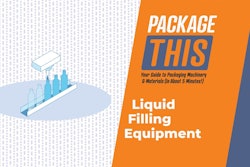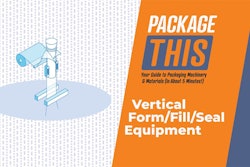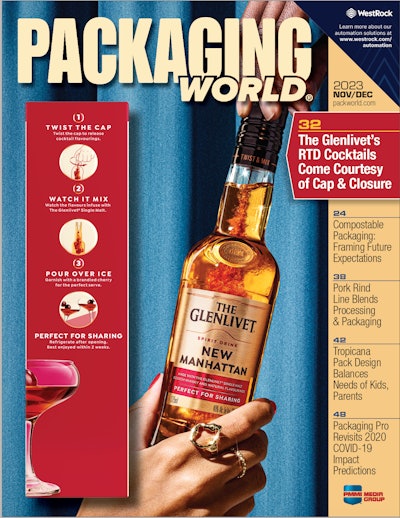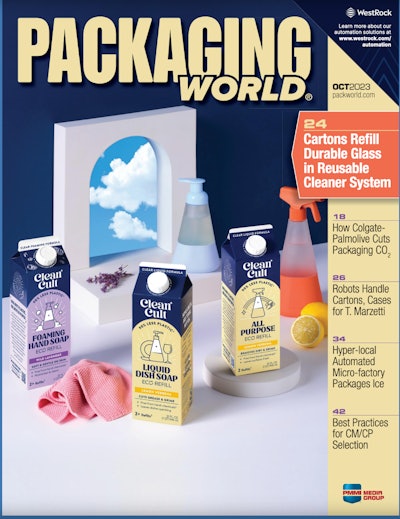The UnPACKed with PMMI podcast welcomed a woman who has made a career out of breaking barriers in typically male-dominated positions, Super Bowl Referee Sarah Thomas. Thomas kicked down doors as the first woman in major college football, the first full-time female NFL referee, and the first-ever female referee at an NFL playoff game. While she didn’t set out to be a trailblazer, she recognizes that her role as a prominent woman impacts younger women and offers tips on navigating unusual career paths.
To subscribe, rate, review, and find more unPACKED podcast episodes, visit pmmi.org/podcast or find us on Apple podcasts, Spotify, iHeart Radio or wherever you listen to your podcasts.
 | Read the full transcript below.
|
Sean Riley:
So with all the fancy introductions out of the way. I'm honored to welcome to the podcast, Sarah Thomas.
Sarah Thomas:
Well, hi Sean. Thanks for having me.
Sean Riley:
Pleasure is all ours. So you have quite a famous reputation as the first woman full-time ref in the NFL and you said [during your talk] that you were really appreciative when the NFL didn't make a big deal of announcing that you were the first woman to be a referee. And to be honest with you I am a die-hard NFL fan and I usually, it'll be, "Oh, I didn't even know this. But that's a woman ref. That's a NFL..." Usually if it's not announced or anything like that, it just comes out in the flow.
So I guess, from your aspect, I understand not wanting to have it be trumpeted like that, but then I guess the other opposite extreme where someone like other women, you're kind of something they see and get inspired. So how do you balance that with you not wanting to be a big deal, but then you are kind of a standard bearer?
Sarah Thomas:
Sean, it's definitely a question and it's one that I've juggled with because now I have a daughter.
Sean Riley:
Exactly.
Sarah Thomas:
I will tell you first, thank you being an avid NFL fan because we truly appreciate-
Sean Riley:
Oh.
Sarah Thomas:
... people like you-
Sean Riley:
[inaudible 00:01:48]
Sarah Thomas:
... who love the sport because the shield is just amazing to be a part of. But balancing this with just like my daughter or my daughter's friends or the little fellows that she runs around with or my sons and their baseball teammates and they just want to sit around and ask you questions like you're the first or you did this. I am telling you I did fall in love with it, not having a clue that it wasn't something that women did. It never crossed my mind. But I know people get wrapped up in the celebration, if you will, of being a first and that was the main goal, I think that I would have failed. I do hope to, a lot of them that did the first, and you can just tell it wasn't, "Oh, I'm going to be the first." They fell in love with something and just because they didn't look like the norm, didn't discourage them which maybe that's the voice that I want is, "Don't be discouraged just because you don't look like the norm."
Sean Riley:
Right.
Sarah Thomas:
If you happen to be the first, then embrace it, yeah. And juggling it and being around, like I said, my daughter who wants to dress up as me at Halloween and the famous Mississippians or they do the wax museums-
Sean Riley:
Sure.
Sarah Thomas:
... and [inaudible 00:03:07] and look at it and you go, "This is leaving a mark. It is leaving a positive mark." That's what I want. So if it is the balance, I want everyone to see it that she just did something she fell in love with. I haven't forgotten where I come from, but being a first and carrying that torch, I want to be respected for it. And I want all of the young females or even whoever [inaudible 00:03:34]
Sean Riley:
Sure.
Sarah Thomas:
... to know you can do it and the reputation I leave or the mark I leave for it to be a very positive one.
Sean Riley:
Very interesting. I was trying to balance that in my head, how you had come to... It is interesting response that you gave and I'm sure having a daughter also puts it into a different perspective. I have a daughter and I'm sure she'll be thrilled to know that I spoke with you as well. Our industry is not the NFL, but it's manufacturing and manufacturing is typically a male dominated, it's very old. You described walking into the first room when you first went to be a referee and you were just... a bunch of old men looking back at you. How can you see women kind of taking what you're saying, and how you just walked in there and didn't see that as anything different. It was just something you wanted to do and apply that to them going into...
Because again, this is an industry that you can have great careers in and there are more women that are joining it. It's not the 1920s where there are manufacturing plants with grease and [inaudible 00:04:47] stuff. So is it just that attitude of not necessarily going into it as trying to be the first woman, just going into it because it's a career or a path you want to take.
Sarah Thomas:
I believe, walking into that first meeting, the fear of the unknown, when you see someone that doesn't look like you, me being a female that walks into this male-dominated profession, the fear on their side is, "Why is she here?" The disruption that they're afraid would happen because a woman walks in. And if a man walked into a different role or whatever it may be, I believe it's just your mindset. Are you in here for the right reasons? Or is your agenda to do something, "Oh, well, I'm going to [inaudible 00:05:34] my voice, being the first or whatever." And disrupt everything. I'm not of the old-school mentality if it's not broke, don't fix it. I do believe we have to evolve.
Sean Riley:
Sure.
Sarah Thomas:
I don't want to see people, "Oh, well, no, we can't. It's still this mindset." Because then I'm going to look at them and go, "You're still using dial-up internet when there's wifi." I mean, you have to evolve, right?
Sean Riley:
Sure.
Sarah Thomas:
But I think it is just truly the fear of anything unknown. And I didn't have that fear walking in because I'd always been around my brothers, just from [inaudible 00:06:06] I still was a young girl growing up too. But I just love sports and I think that if I were to pass on some message to anyone, it's, "Don't go in there with an agenda that you are going to disrupt. Go in there with the mindset, 'Okay, I want to be a part of this program or a part of this company because I believe in it.'" But if I walk in, I'm not the norm, I don't want them to be intimidated by me. I want eventually for them to respect me, but also this is for the betterment of the company. But if you go in there with this agenda, I think, to disrupt everything, to me, I don't know what that is. That's somebody that's just come to crucify everybody. I think that no matter what it is. I think just having [inaudible 00:06:46]
Sean Riley:
That's interesting. I was going to touch on it, but I guess you come across as a very, and you've said, you're very self-motivating. You come across very confident. Is that something that, especially from a sports perspective, is just from the rough and tumble of being a girl with brothers, you think?
Sarah Thomas:
I really don't know. I think I contribute it, of course, to my upbringing, my faith, my mother and father and give grace and stay humble and, of course, my brothers. But also sports. I played sports. And I know it's not just sports. It's extracurricular activities, children are learning discipline and authoritative figures on any level, whether it's in radio broadcast because that is a very grueling, demanding... to where I said, my major is communications, but I said, "I'm not doing that. I don't want to have to have those deadlines."
Sean Riley:
Right.
Sarah Thomas:
Or if it's in the band. I played in the band. I was a flag twirler. I mean, there are so many extracurricular activities that I do believe contributed to building that, I guess, confidence. I mean, there's been times where I questioned or I continue to question, but I just believe it was my upbringing, but also I think sports and extracurricular activities held me accountable to start with [inaudible 00:08:05] one that, hey, there's politics everywhere you go and if you're constantly trying to compare what you have [inaudible 00:08:14] and you will be robbing yourself of something that you truly love if you sit back and you go, "Well, they did it. I'm just going to quit." That's, I think, just the biggest thing I've learned. As far as confidence, I mean, I still have my moments. I do
Sean Riley:
Yeah, that's interesting. That touches on another thing that I was kind of discussing beforehand. You and I are closer in age and in a generation where when I was a kid in the early '80s and stuff like that, there wasn't necessarily, as you described, girls' teams.
Sarah Thomas:
Yeah.
Sean Riley:
And there wasn't an abundance of opportunities for girls. My daughter's 14, she's been playing soccer, volleyball, basketball since she could run around. It's just been, like you said, an evolution of... You're one of those people where you wanted to play, you had to play on the boys' team.
Sarah Thomas:
Yeah. It's crazy, Sean. I mean, I'll be 49. I'm much older than you, but it's crazy to think, did I really not have that many opportunities? But we didn't. I mean, I was playing [inaudible 00:09:25] the boys-
Sean Riley:
Right.
Sarah Thomas:
[inaudible 00:09:26] an opportunity and it blows my mind, thinking that my daughter wouldn't have a chance to play. But if there weren't... I'm not saying me, but if the Billie Jean Kings and [inaudible 00:09:36] and Jackie Robinson... I mean, somebody's even asked [inaudible 00:09:41] I'm like, "No, I don't feel. He was a Black male in the early 1940s." But I mean, a long time ago. I said, "I pray I have the poise that grace that he and his wife demonstrated through that time." But if we didn't have him and those before us, if we didn't have Bailey [inaudible 00:10:03] doing what she does, it blows my mind, but you think about it and we didn't have that.
Sean Riley:
No.
Sarah Thomas:
[inaudible 00:10:09]
Sean Riley:
Yeah. And it is, but to that point again, you don't want to be recognized as the girl playing a boys' sport, you just want to be a girl playing sports.
Sarah Thomas:
[inaudible 00:10:19]
Sean Riley:
Right. But those little incremental things through time eventually get to where it's second nature for our children to play the sport. So I guess it is, like you said, it's an evolution like anything else.
Sarah Thomas:
Sean, I don't want to go off on a tangent, but it's football. I've had more young girls or fathers tell me, "My daughter wants to play football." I go, "Let her. Let her." And they will. So the flag football, you'll see, they're now having more and more of that for females. But yeah, it's just evolving.
Sean Riley:
Yeah, and going back to that, I remember growing up, there might be one or two or a handful of girls that were playing. Then you'd read stories where ones would move up different levels and it's gotten to where there was a kicker that was kicking, I guess, in college-
Sarah Thomas:
Yes.
Sean Riley:
[inaudible 00:11:06] I think.
Sarah Thomas:
Yeah. Sarah Fuller.
Sean Riley:
[inaudible 00:11:09]
Sarah Thomas:
[inaudible 00:11:08]
Sean Riley:
She's phenomenal.
Sarah Thomas:
Yeah, just continuing, like you said, evolution of everything else. With that, did you get to a point where you stopped noticing or did it ever become... I guess, in the beginning, you'd been noticed, you were walking in and there was a bunch of men looking back at you. Has it gotten to a point where you are just a referee working in NFL-
Sean Riley:
Yes.
Sarah Thomas:
Yeah?
Sean Riley:
Yeah. You [inaudible 00:11:35]
Sarah Thomas:
I can't say when I... I've been asked the question of defining the moment. I cannot tell you there's a defining moment. But yes, I am just an official now in the NFL.
Sean Riley:
I mean, we're talking about the NFL. It's a rough environment out there on the field. You shared the clip of you getting knocked over in a play. It's inevitable, it's going to happen. This is a question-
Sarah Thomas:
Sure.
Sean Riley:
... I'm curious about. When you stepped on at that level for the first time and the speed and the contact, was it surprising? Or was it just you were there to do a job and you kind of adapted?
Sarah Thomas:
Yeah, I wouldn't say my first game, I was surprised because they are a master at what they do and as far as hiring officials to go into the NFL, they train us. We go to the training camps. Of course, back when I was doing training camps, it was still your two a day, zero [inaudible 00:12:31] full path. It was a little different than it is now, not that there's not a grind for all of those players. I'm not saying that. But I was saying that they prep you well enough before you go and have your first game, so surprise no. But can I tell you literally like a blur?
Sean Riley:
Yeah.
Sarah Thomas:
Yeah. Not because of the speed, it was just you think that you are ready, and you are, but then there's so many things from the college to the pro and there are generally so many other conferences or [inaudible 00:12:58] you can get or [inaudible 00:13:00] get the call to go to the NFL, but I can just say it's like a blur. Just, "Okay, I do need to know everything about ICC and these are some things that we call." But I think it was just more of a blur. Nothing surprised me, but maybe how much I really needed to start looking at more [inaudible 00:13:17] stuff like that.
Sean Riley:
That's interesting because you even hear from players that they get... These are elite, world-class athletes that played at a very, very high level of college and they step on the NFL field and they're just stunned by everybody's that fast and everybody's big.
Sarah Thomas:
Yeah.
Sean Riley:
Very interesting. So I guess to kind of wrap this up and you sort of did it at the end of your talk, because you talked about a bunch of things, sort of not to do. And one of them was not to do things for recognition. Was there any other ones like that that you can kind of touch on to kind of [inaudible 00:13:50]
Sarah Thomas:
I know when I was younger, a lot of my friends were, "Damn, you didn't pick me to play all stars and so I'm going to show you." I have a complete different mindset now and I've had that for probably the last 15, 20 years, is don't try to prove people wrong. I keep saying it starts with you. You have to look in the mirror because I've learned... When I was younger, "I'll show you." Well, then I get into college and I was like, "I need to show this person to prove to them I'm going to go to this." It never ends and you're going to exhaust yourself for somebody else when it's just like, shift your mindset, look in the mirror, start with number one and prove to yourself that you belong where you are. If you are lacking in an area, just figure out a way. [inaudible 00:14:30] something that you can do, but you need to start with yourself and prove to yourself that you belong where you are.
Sean Riley:
Yeah, and you said a comment where someone, when you didn't make it the first time, sort of pointed out that you weren't going to make it. And your initial, immediate response, which kind of goes to that point, was not a "What did I do wrong?" in a sad way, a "What did I do wrong so I can fix it?" kind of way.
Sarah Thomas:
Absolutely. Yeah, I am definitely about a solution. I remember my daughter, I stepped on a piece of glass one time and she said, "Mom, do you ever cry." And I had to take a little pause there and go, "Hm. I don't know that I've ever cried." [inaudible 00:15:05] I just told her, I said, "Yes, if Mama's hurt or Mama's really sad about something, of course, I'll cry." I said, but at that moment when I stepped on that piece of glass, I knew the solution was to get it out. But if I sit and I cry about it, it's not going to get itself out. So I'm really about getting to a solution and if I'm doubting myself or if I am questioning things, I just have to start with me and just figure out why am I lacking here or why do I make this mistake? Or why am I [inaudible 00:15:32]
Sean Riley:
Perfect. Exact thing that we can obviously, man, women and child, anyone could take away from this as something to use. Well, I just want to thank you, Sarah, because you just gave a presentation at our annual meeting and to tack on even additional time, we really appreciate you. So thank you for coming on.
Sarah Thomas:
Yeah, Sean. Well, thanks for having me






















